It can be concerning if you hear a rattling coming from your car when you accelerate. It can raise a lot of questions as to what could be wrong. That's why in this article, we have taken the time to answer these questions!
If your car is making a rattling noise when you are accelerating, then the source of the problem is more than likely coming from your engine or exhaust. However, pinpointing the culprit exactly can be difficult. With that being said, it could be due to one of the following:
- Low engine oil
- Bad timing chain or timing belt
- Faulty spark plugs
- Piston slap
- Bad knock sensor
- Corroded exhaust
- Bad torque converter
- Faulty catalytic converter
- Bad muffler
- Loose exhaust system
- A worn-out idler or tensioner pulley
- Loose serpentine belt
- An issue with drive belt pulley
- A Loose heat shield
- Broken or unsecured engine mount
- Faulty water pump
Trying to diagnose a car issue like a rattling sound can be challenging to do on your own. That's why in this article, we will take a closer look at the functions of these car parts and as to why they could be the source of the issue. In addition, we will take a look at the average cost to fix the rattling noise, so read on!
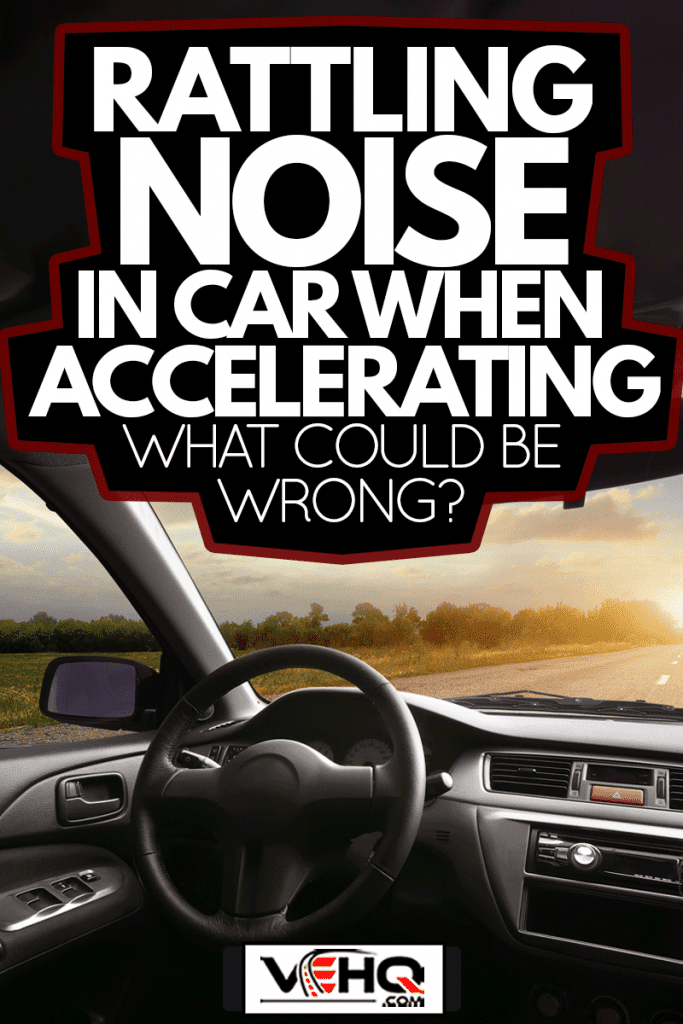
Rattling Noise In Car When Accelerating—What Could Be Wrong?
The rattling noise in your car when you accelerate could be coming from any number of places. It's important to know what the cause is before taking action.
These issues can lead to increased engine vibrations, producing a loud sound as you accelerate and decelerate. Let's dive deeper into each of these possible issues and their functions:
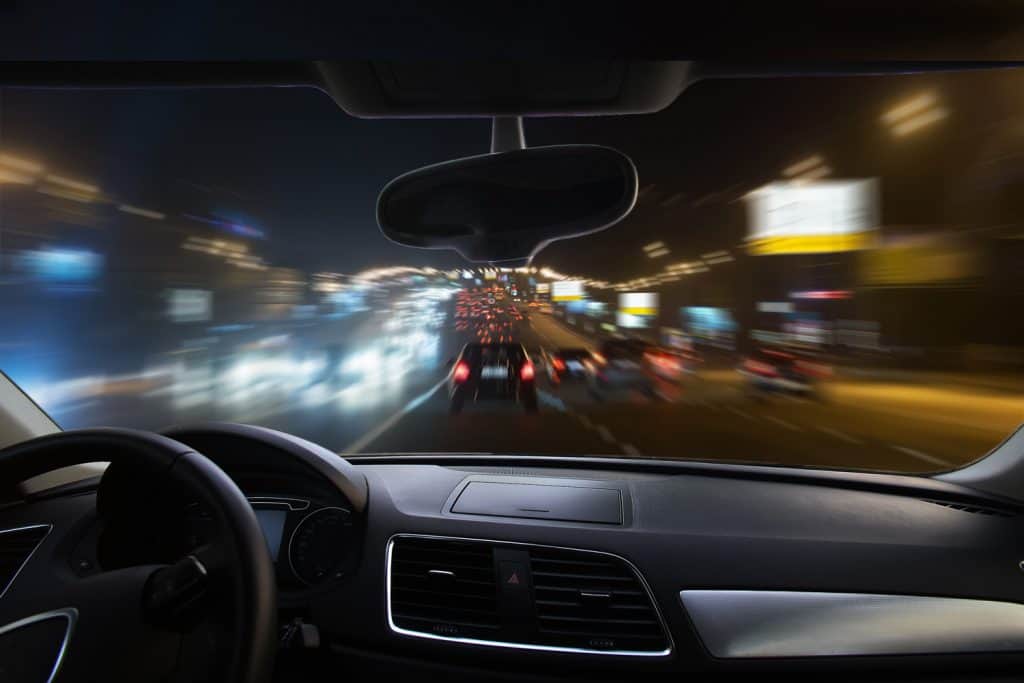
Low Engine Oil
If you notice an increase in engine noise and vibration making rattling noises, it may be due to low engine oil. When the engine is running, it will produce a certain amount of heat within itself, which can cause the oil to break down. This often requires you to add more at your next scheduled oil change interval.
Bad Timing Chain or Timing Belt
Your car has multiple timing chains and belts that all serve specific purposes. A rattling noise due to a wrong timing chain or belt could be caused by breaking down either one of these components.
Unfortunately, this isn't always an easy fix as it can require you to replace the part, which is more than likely cost-prohibitive in nature.
Faulty Spark Plugs
Older cars with high mileage may have faulty spark plugs due to corrosion. This can result in a rattling noise which you'll notice as your drive and accelerate.
It can be challenging to inspect the issue on your own unless you have experience working on cars. Many people will rely on their local mechanic for assistance when this occurs.
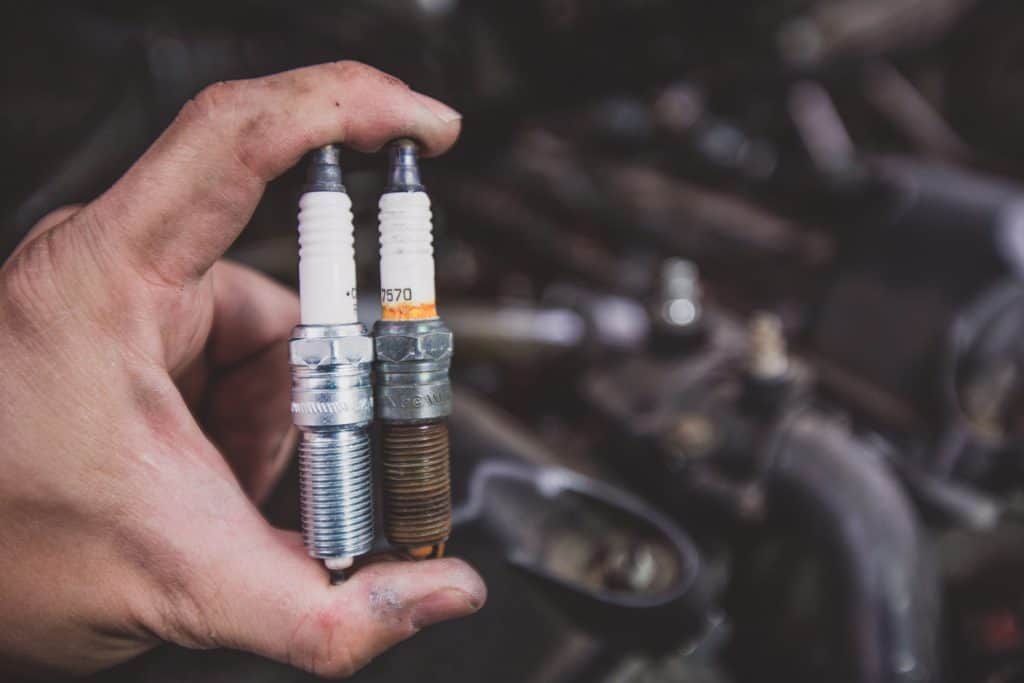
Piston Slap
Another cause for a rattling noise when you accelerate can come from a piston slap. This is where the pistons are hitting the cylinder walls of your engine due to poor lubrication.
It's an issue with older cars that have seen high mileage on their odometer. An issue like a piston slap is more concerning than others on this list because it could mean an engine rebuild.
Bad Knock Sensor
A bad knock sensor can cause a loud rattling noise as you accelerate. It's worth checking your engine oil level first as it could be low, which leads to this problem.
A bad knock sensor has been known to go off when the oil is low.
Corroded Exhaust
When rust or debris is on the exhaust system, it can lead to rattling noises while accelerating. The sound becomes worse when the engine is under load, which makes sense.
However, it's not an easy fix unless you can turn off your car and get underneath to inspect what exactly is causing the noise.
Bad Torque Converter
A bad torque converter can increase rattling or knocking sounds as you accelerate. Again, this will be more prevalent when you are idle rather than underload.
Faulty Catalytic Converter
A faulty catalytic converter can be a common cause of rattling or knocking sounds while you accelerate. This will not typically lead to any noticeable increase in engine RPMs, but rather, it's due to an added load on the engine from a compromised emission control system.
Bad Muffler
A damaged or broken muffler can lead to a rattling noise as you accelerate. This is a common reason many people have a rattling noise when they step on their gas pedal.
Loose Exhaust System
A loose exhaust system can lead to rattling or knocking sounds as you accelerate. This usually happens on older cars with high mileage that have seen higher than usual amounts of vibration due to various components wearing down.
Serpentine Belt
The serpentine belt is a long, flat belt that fits around several different car components. These include your accessory pulleys like the alternator and power steering pump and drive belts that connect to different parts of your engine.
Because it sits above other vital system components, it can be easy for this belt to rip, fray, or break. However, these belts are designed to be relatively thin to save on space, and they work hard as a result.
This can cause them to weaken over time due to heat and friction. If your serpentine belt is going bad, you will usually hear a loud rattling noise when the engine is revved up.
An issue with Drive Belt Pulley
The drive belt pulley is a vital component that can cause a rattling or knocking sound as you accelerate. Its primary purpose is to transfer rotational energy from the engine to the serpentine belt.
Despite its name, it doesn't hold any belts onto the car's body as many people think. Instead, it turns them with a smooth motion to avoid causing any noise.
A Loose Heat Shield
As you accelerate, the heat shield around your catalytic converter can shake loose. This is due to the vibration and acceleration of the engine.
Keeping an eye on it after you start up your car will help you notice any rattling noise coming from that area at higher RPMs or speeds.
Broken or Unsecured Engine Mounts
When engine mounts break or loosen over time, it can cause a rattling noise as you accelerate. These are designed to hold engine components in place at all times.
They're helpful because they reduce the amount of noise your car makes and prevent further damage from occurring.
If your breaks aren't working very well, you can also hear an increased amount of rattling noise as you accelerate because your car is working harder to stop. This will be even more noticeable if you are turning or braking at the same time.
Faulty Water Pump
Many people get a rattling noise when accelerating if their water pump starts to fail.
This can happen because the impeller begins to break down from fatigue. If your car overheats, this part of your engine can warp entirely and break apart.
This will cause even more rattling sounds as you accelerate because there will be no water flow at all.
How do you know if a spark plug is loose?
If you have a loose spark plug, it will usually cause the engine to idle roughly or stall entirely. You may also notice that your car shakes or vibrates more than usual at this time as well.
The issue with your spark plug isn't creating noise but rather lack of power and misfires.
What does a rattling timing chain sound like?
A rattling timing chain will usually cause your car to idle roughly or stall entirely. However, you may also notice that it shakes or vibrates at this time as well.
In addition, you may hear metal grinding sounds that can be constant or even intermittent. Your engine may also fail to start until you hear the timing chain tensioner take up the slack in the timing chain.
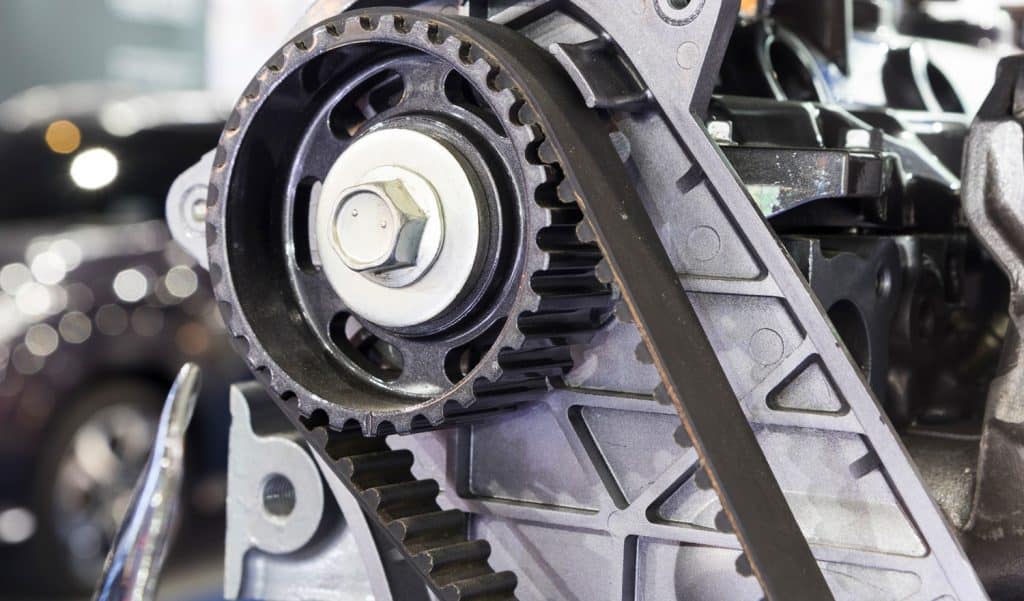
How do I fix a rattling noise when I accelerate?
Rattling noise when accelerating is usually caused by something simple. For example, you can check your belts to see if any are loose or broken. Start with the simple things, such as parts being loose around the exhaust.
You should also take a close look at the heat shield around your catalytic converter to make sure it isn't shaking loose. Of course, it could be another part entirely like the water pump, but this will depend on the noise you hear.
If your engine mounts are loose or broken, try tightening them up or replacing them as needed to ease the noise.
If there is metal-on-metal contact inside your engine because of a timing chain issue, you may need to replace your timing belt and tensioner as well. For spark plugs, clean and tighten those in your engine to help reduce the noise.
If it seems over your head or tightening the parts mentioned above doesn't work, then reach out to a trusted certified mechanic for help!
How much does it cost to fix a rattling noise when accelerating?
This is a tricky question to directly answer because the price can vary tremendously depending on what is causing the rattling. For example, a fix on your timing belt or timing chain can range from $500 to $1500.
Now getting your heatshield or exhaust tightened could be a simple fix that could cost you only an hour of labor. But, unfortunately, you can fix the problem yourself or have someone give you a price quote.
Final Thoughts
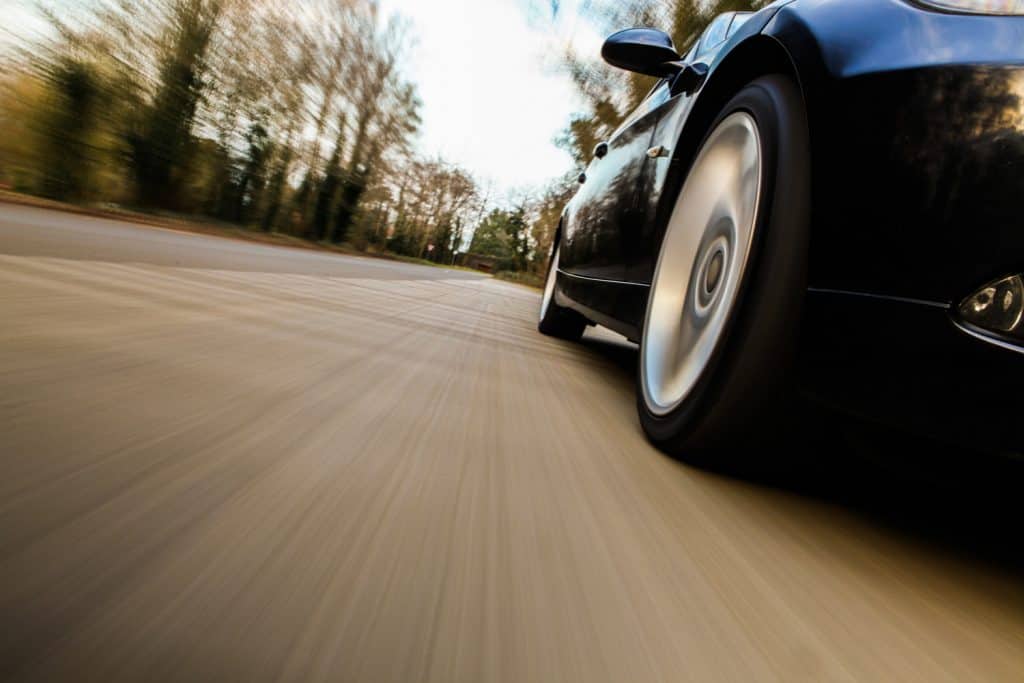
Overall, it is tough to pinpoint exactly why your car is rattling when you accelerate. However, it can be pretty simple and inexpensive to fix, such as a loose exhaust part or heatshield. Nonetheless, if you have this issue, it is essential to address it right away before things worsen!
For more maintenance guides, you should also check out:
Tire Has A Bubble — What To Do?
